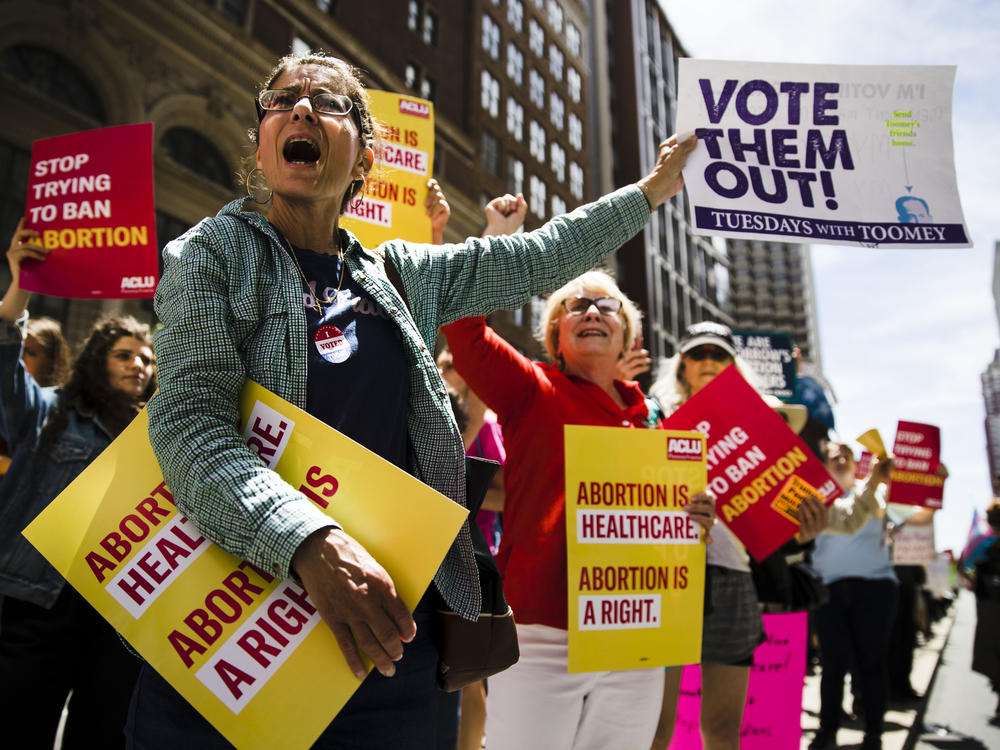Section Branding
Header Content
Pennsylvania high court revives a case challenging Medicaid limits for abortions
Primary Content
HARRISBURG, Pa. — Pennsylvania's Supreme Court said Monday that a lower court must hear a challenge to the constitutionality of a decades-old state law that limits the use of Medicaid dollars to cover the cost of abortions, a major victory for Planned Parenthood and the abortion clinic operators who sued.
The decision also elicited hope that the state Supreme Court may one day find a right to abortion in Pennsylvania's constitution after the U.S. Supreme Court ended nearly a half-century of federal abortion protections by overturning Roe v. Wade.
The 3-2 decision both overturns a lower court decision to dismiss the case on procedural grounds and puts aside a 1985 state Supreme Court decision that upheld a law banning the use of state Medicaid dollars for abortion, except in cases of rape, incest or to save the life of the mother.
Alexis McGill Johnson, Planned Parenthood Federation of America's president and CEO, called the decision a "landmark victory for reproductive freedom."
The high court's majority said Monday in a 219-page decision that prior court decisions did not fully consider the breadth of state constitutional protections against discrimination, beyond those provided by the federal constitution.
The lawsuit, brought in 2019 by Planned Parenthood and other operators of abortion clinics, said the 1982 law unconstitutionally discriminates against poor women.
"Today's ruling is the first step toward ending discriminatory access to care, and we remain committed to removing every barrier to abortion," Signe Espinoza, executive director of Planned Parenthood of Pennsylvania's policy arm, said in a statement.
The state House's Republican floor leader, Rep. Bryan Cutler, had opposed the lawsuit in court and on Monday accused the state Supreme Court of "seeking to overstep its authority and change well-settled law."
The new ruling does not necessarily find a constitutional right to an abortion in Pennsylvania, where abortion is legal under state law through 23 weeks of pregnancy.
Rather, it turns on the question of whether the state Medicaid law unconstitutionally singled out a procedure sought only by women and differentiated between women who carry to term and women who get an abortion.
Women who get an abortion receive no government funding for the reproductive care they seek, while women who carry to term receive full coverage, the majority opinion said. Seventeen other states cover abortion in their state Medicaid programs, the court said.
The lower Commonwealth Court had said in its 2022 decision that it was bound by the prior state Supreme Court decision in dismissing the lawsuit.
But the majority said the lower court must now reconsider the case under a more stringent constitutional standard.
That part of the majority opinion was written by Justice Christine Donohue and joined by Justices David Wecht and Dougherty. Dissenting were Chief Justice Debra Todd and Justice Sally Mundy, the lone Republican to take part in the decision.
Todd and Mundy disagreed that the high court had issued a flawed decision in 1985. In her dissent, Mundy wrote that the 1985 decision was "well-considered, restrained and appropriate," and preserved the balance of power between the judicial and legislative branches.
That balance will be upset, however, if the court prevents lawmakers from advancing a state interest — for instance, encouraging childbirth over abortion — by prioritizing how to spend public money, Mundy wrote.
Justices Kevin Brobson and Daniel McCaffery joined the bench after the case was argued and didn't participate in the decision.
In one part of the majority opinion, Donohue made it clear that she sees a state constitutional right to abortion in the existing structure of Pennsylvania's constitution.
"We conclude that the Pennsylvania Constitution secures the fundamental right to reproductive autonomy, which includes a right to decide whether to have an abortion or to carry a pregnancy to term," Donohue wrote.
Wecht joined that part of the opinion. However, the other three justices did not.
Dougherty said he agreed with Todd and Mundy that the case is not about the right to an abortion, but qualified it in his written opinion by saying "at least, not yet."
David S. Cohen, a constitutional law professor at Drexel University's law school who helped argue the case, acknowledged that a majority of the court didn't find a fundamental right to abortion in Pennsylvania.
But, Cohen said, the issue will come back to the court in the future "and we now have a great building block to accomplish that goal."
Copyright 2024 NPR. To see more, visit https://www.npr.org.

